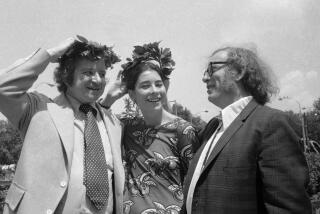Joseph Parkhurst; Pioneering Publisher of Cycle World
- Share via
COSTA MESA — Joseph Conrad Parkhurst, who brought journalism to motorcycle magazines with his founding of Cycle World in 1962, has died at age 74.
Parkhurst, a Costa Mesa resident, had lung cancer and died in his sleep early Tuesday as a result of a blood clot in his lung, a complication of chemotherapy, said his wife, Claire Parkhurst.
Objective journalism was seldom found in motorcycle periodicals before Parkhurst launched Cycle World in 1962. But Cycle World offered road tests and a more critical eye than other fan-oriented motorcycle magazines, said Don Brown of DJB Associates LLC of Irvine, a motorcycle industry analyst.
In one year, Cycle World became--and remains--the largest motorcycle magazine in the world, Brown and others said. Its paid monthly circulation is 315,000, and its closest rival is the German magazine Das Motorrad, said its current publisher, Larry Little.
“Joe was a true pioneer in our business,” Little said, “because he directly affected the way enthusiast publications were done. . . . It was kind of a breaking of a good old boy network of American motorcycles. Joe did not shun the Japanese makers.”
Born in Jonesboro, Ark., on Oct. 20, 1926, Parkhurst was 3 when his family moved to California, his wife said. After graduating from Van Nuys High School, he enlisted in the Army and was a private, stationed in Hawaii. He served in 1954-56 as a clerk in an Army Reserves office, then took a job as art director of Road & Track magazine in Newport Beach. He later quit to spend a year traveling in Europe, where he was a freelance photographer for the magazine. In 1960, he returned to become art director for Carting World, a go-cart magazine.
From there, Parkhurst dreamed of another world--Cycle World. Joe Rusz, a senior editor at Road & Track, the magazine with offices in the same Newport Beach building as Cycle World, said Parkhurst thought that Road & Track’s consumer approach could serve motorcyclists. He also loved riding motorcycles, and once told a friend that he “could never find something worthwhile to read about them,” Little recalled.
Parkhurst scraped the money together for Cycle World’s first issue in January, 1962. The late Gordon Jennings, in one of his last columns for rival Motorcyclist magazine, wrote about his own early days as technical director at Cycle World, when money was scarce.
“Parkhurst talked the printers into extending a line of credit, sold his sailboat and Porsche, drove around in an old Ford station wagon with matching holes in its floor and exhaust system, and on a couple of occasions borrowed eating money from me. It was hollow-belly time for him, and things stayed that way for many lean months,” Jennings wrote. “I think most men would have tossed in their cards. He didn’t, and Cycle World became America’s first modern-era motorcycle magazine.”
Parkhurst’s timing was superb. Japanese motorcycle manufacturers, which now dominate world sales, were just entering the marketplace when Cycle World debuted, Brown said.
“He started at exactly the right time,” said Brown, who was editor of Cycle magazine before Parkhurst launched its competitor, “because Yamaha and Honda came into the U.S. market in 1959. And retail sales of motorcycles of all kinds increased from about 60,000 new units a year in 1969 to about 750,000 new motorcycles a year by 1970. So during that period, Joe and, of course, the other competing magazines . . . grew.”
Some years later, Parkhurst merged with another company that owned Road & Track to become Bond/Parkhurst Publishing. That outfit sold both magazines in the early 1970s, Claire Parkhurst said. He remained a consulting publisher through 1975. Since 1979, he had written and published the Motorcycle Business Newsletter, a respected biweekly for industry insiders. He rode dune buggies off-road in Baja California and loved to sail.
In addition to his wife of 22 years, Parkhurst is survived by his brother John Parkhurst of Hemet.
As was his wish, Claire Parkhurst said, his ashes will be scattered off the coast of Catalina Island. A memorial is planned for January.
More to Read
Inside the business of entertainment
The Wide Shot brings you news, analysis and insights on everything from streaming wars to production — and what it all means for the future.
You may occasionally receive promotional content from the Los Angeles Times.








